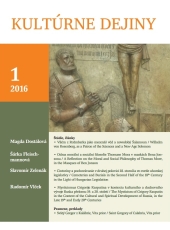Mysticismus Grigorije Rasputina v kontextu kulturního a duchovního vývoje Ruska přelomu 19. a 20. století
The Mysticism of Grigory Rasputin in the Context of the Cultural and Spiritual Development of Russia, in the Late 19th and Early 20th Centuries
Author(s): Radomir VlčekSubject(s): History
Published by: VERBUM - vydavateľstvo Katolíckej univerzity v Ružomberku
Keywords: Russia; the Russian Orthodox Church; the old man; Rasputin
Summary/Abstract: This paper aims to bring the mysticism of controversial personality, Grigory Rasputin, within the context of the Russian elders and the operation of the Russian Orthodox Church, but also the overall picture of the cultural, economic and political status of Russia of the late 19th and early 20th centuries, as well as the life of Russian society at that time. This is a contribution to the cultural, spiritual and wider everyday history of Russia, in the late 19th and early 20th centuries. It is especially about the demystification of the claims about the exceptionality of the extraordinary capabilities of Grigori Rasputin and his considerable influence on leading figures in Russian politics. The work is of an analytic character; it draws mainly from the sources of a personal nature and primary literature, but also relies on secondary literature, especially the latest knowledge of Russian historiography. The study is based upon and, in particular in the context of what is happening, develops and supplements the author‘s study, Grigory Rasputin and Russia in the 19th and 20th centuries, which was compiled in 2003. Within it, the mentioned knowledge develops and especially implants into a new, broader context. New is interpreting Rasputin as part of the system.Grigory Rasputin was one of the most famous personalities of the Russian spiritual world of the late 19th and 20th centuries. He was an extremely famous man, who was leaning against the traditional Russian belief that the truth can be told and spread only by a simple man – a muzhik. Rasputin undoubtedly had healing abilities. He was a visionary with extraordinary abilities of memory. This enabled him to interpret some doctrinal matters with extraordinary precision, according to what he copied from the monks on Mount Athos. This has linked him with the Russian elders – missionaries, ascetics and mystics in one person, becoming extremely attractive, even among circles of St. Petersburg’s church hierarchy. His healing skills then had a positive impact on Tsarevich Alexei, who suffered from incurable haemophilia. For this, especially Tsarina Alexandra, but also the Russian Tsar Nicholas II, was extremely appreciative, who saw in him a valuable mentor in many matters of life in Russia. Rasputin, however, did not have absolute power. He organically and linearly fit among the other elders and mystics, from whom, in the folk religion, were expected to not only predict the threat of the end of the world, but also show whether and how they can desirably stave it off. Mystical séances to which Rasputin was invited, were an attempt to predict the future of individuals and everyone, and to satisfy the desires that the participants of such actions had in mind.
Journal: Kultúrne dejiny
- Issue Year: 7/2016
- Issue No: 1
- Page Range: 52-95
- Page Count: 44
- Language: Czech

